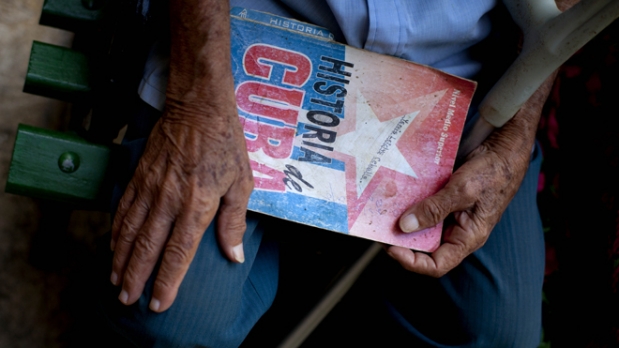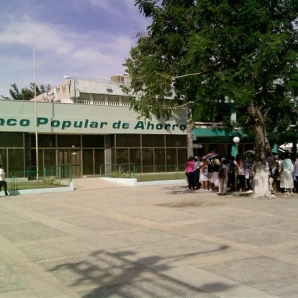
According to the Center for Population and Development Studies of the National Bureau of Statistics of Cuba by 2025 some 26.1% of the population be 60 years and older, which makes us a country with one of the highest indices of aging in Latin America. Being retired in Cuba today means belonging to a population group distinguished not only by its lack of productivity, but also for its lack of economic resources. The “Revolution” prides itself on having bettered the quality of life for Cubans, especially in the area of health. Today we can satisfy ourselves that life expectancy is comparable to that of developed countries (75 years on average), praiseworthy if this quality is maintained in all aspects of the lives of older adults.
Today, if the retired want to supplement their income that have no other option than to turn to family members for help or to turn to “self-employment.” It’s become common to see old people in whatever neighborhood, seated or walking around, selling cigarettes at retail, peanuts, or whatever other scarce product allows them to get some money every day to be able to deal with prices that rise while salaries remain stagnant.

In Santiago de Cuba its an ordinary occurrence to see, twice a month, the degrading spectacle of banks overcrowded with old people, standing in line from the night before, filling the sidewalks and parks around the banking institutions for several hours and at times even days, waiting to collect. They are men and women who have dedicated forty years or more to working for the Government that today repays them with the torture of a miserable pension.
The retirees are divided into two large groups: those who collect up to 200 pesos ($8.30 US) and those who collect more, the first at the end of the month and the second at the beginning. In fact, the banks have taken measures with respect to this: the days designated for collection of pensions have that as a priority and others are not served.
For Maria Elena, 76, retired hairdresser, the pension collection day has become the most important day in her life for the last ten years.
“In the two or three days my pension lasts I feed my taste, I can buy a nice bite of ham and cheese, I can buy meat, and arrange some other things. But for me the most important is the food, even if it’s bad,” she said from the front of the collection line at the People’s Savings Bank.
Maria Elena belongs to the more than 2 million Cubans over 60 who receive a pension that’s less than the average wage. Many of the were imbued with the Revolutionary spirit at the start of the Revolution, they cling to the ration book and their faith that the government will protect them. They don’t understand that the announced economic changes point to a veiled market society that they’ve been isolated from.
Hilda, 81, retired from the municipal sector, said, “I live thanks to the support of my children who give me products to sell on the black market at a profit. It’s not easy for us because we also have health limitations and the chances for some other work don’t exist, much less now that they’re laying off young people.”
The challenge of old age
To address the problems of aging is a challenge for the government. In Santiago de Cuba with a population of close to half a million people, there are two nursing homes over capacity, and two “grandparents’ houses,” dedicated to their care while their children are at work. Obviously, these centers are inadequate before the growing demand.
Options have been created that provide food assistance to destitute elderly in various workers’ canteens in businesses near their neighborhoods, and they have even called on the private sector. They are early attempts of a reality that they still don’t know how to take.
Pedro Angel, a retired construction worker 86 and disabled, says he wants to go to a nursing home but can’t do so for lack of places. He has to hope that those who are there will die, “I spend the day alone at home until my daughter comes, I’m missing a leg, I get two free lunches a week at a private Italian restaurant, and with one leg I can’t take care of myself so I hope they give me a place before I die.”
Palliatives don’t solve problems. The situation also affects the working sector, as they are the children who in most cases assume the care of their parents and have to employ a person for that job or leave work themselves, because assistance costs an average of 300 to 500 pesos a month (~$12-$21)and is unattainable on the average salary.
The solutions are not in sight. Amid the “economic restructuring,” addressing the problems of the elderly is not a priority. But something must be done, as the situation will worsen. According to an article in Granma about the new Social Security Act, in 2025 the population over 60 years will surpass three million people.
Lourdes Gómez | Santiago de Cuba
From Diario de Cuba, 2 December 2013
